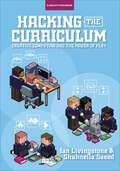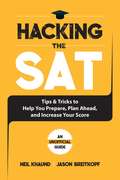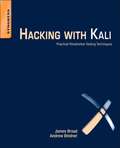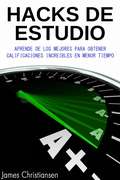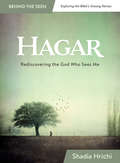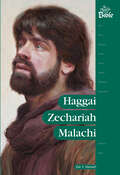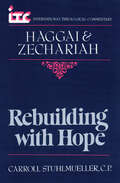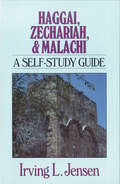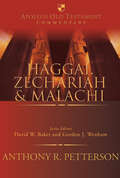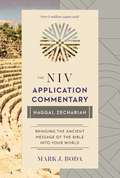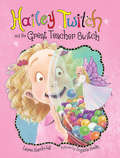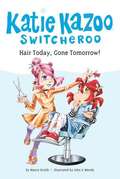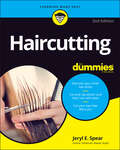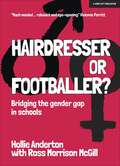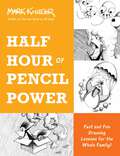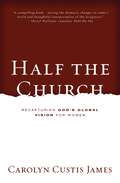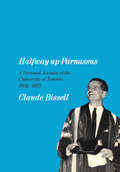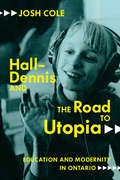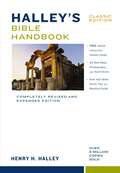- Table View
- List View
Hacking the Curriculum: How Digital Skills Can Save Us from the Robots
by Ian Livingstone Shahneila SaeedIan Livingstone is the Godfather of the British gaming industry. In Hacking the Curriculum, he and Shahneila Saeed explain the critical importance of coding and computing in modern schools - and offer teachers and school leaders real practical guidance on how to improve their current provision to a generation of youngsters for whom digital skills are critical.
Hacking the SAT: Tips and Tricks to Help You Prepare, Plan Ahead, and Increase Your Score
by Jason Breitkopf Neil KhaundLearn all the top tricks to preparing for and acing the SAT and ACT The SAT and ACT are the academic tests that can make or break your entrance into your number one college or university. High school students practice endlessly, and some pay hundreds of dollars an hour for tutors to teach them, just to earn a better score. Endless studying can be mentally exhausting and leave students wanting to do nothing more than throw their books out the window. Sure, those 300 extra points make a difference, but at what cost to your attitude and everyday performance? Instead of drilling into boring test prep books and stretching yourself too thin while trying to complete every practice test available, dive into Hacking the SAT! This all-inclusive insider&’s guide is perfect for parents, teachers and administrators, as well as students themselves. No more last-minute cramming and studying; this entertaining and engaging guide is full of tips and techniques that will have you ready to pass these dreaded standardized tests in plenty of time! This book will provide you with all the hacks you need to pass the SAT or ACT with flying colors, such as: Test prep schedulesWhere to find study materialsStudy tipsTest-taking strategiesAnd much more! Filled with advice from two experienced educational experts, Hacking the SAT is your gateway to acing the SAT or ACT test and entering the college or university of your dreams! Happy studying!
Hacking with Kali: Practical Penetration Testing Techniques
by James Broad Andrew BindnerHacking with Kali introduces you the most current distribution of the de facto standard tool for Linux pen testing. Starting with use of the Kali live CD and progressing through installation on hard drives, thumb drives and SD cards, author James Broad walks you through creating a custom version of the Kali live distribution. You'll learn how to configure networking components, storage devices and system services such as DHCP and web services. Once you're familiar with the basic components of the software, you'll learn how to use Kali through the phases of the penetration testing lifecycle; one major tool from each phase is explained. The book culminates with a chapter on reporting that will provide examples of documents used prior to, during and after the pen test. This guide will benefit information security professionals of all levels, hackers, systems administrators, network administrators, and beginning and intermediate professional pen testers, as well as students majoring in information security. Provides detailed explanations of the complete penetration testing lifecycle Complete linkage of the Kali information, resources and distribution downloads Hands-on exercises reinforce topics
Hacks de Estudio: Aprende De Los Mejores Para Obtener Calificaciones Increíbles En Menor Tiempo
by James Christiansen Maria Esther Wolburg DomínguezYa sea bachillerato, universidad o posgrado, el poder aprender y estudiar eficientemente es extremadamente importante. Saber estudiar correctamente es primordial para el éxito en la escuela y este libro te dará esas habilidades y hábitos de estudio que necesitas. ¡Aprende más, estudia menos y obtén calificaciones increíbles! En este libro aprenderás: 1. Como mejorar tu entorno de estudio 2. Aprovechar al máximo tus clases y tus profesores 3. Cómo administrar tu tiempo de estudio más efectivamente 4. Técnicas de estudio que funcionan 5. Apps recomendados para asistirte en tus estudios ¡Deja de dar pasos a ciegas y reprobando y comienza a estudiar de la manera correcta y compra este libro hoy!
Hadley Adult Continuing Education and High School Course Catalog
by Hadley InstituteCourse Information and more
Hagar: Rediscovering the God Who Sees Me
by Shadia HrichiYou are "The God Who Sees Me." Discover a close relationship with God—no matter the pain or suffering in your life. Witness the depths of God’s compassion through the eyes of Hagar, a runaway slave who meets the living God in a desert of despair, where she gives Him the name El Roi, "The God Who Sees Me." A largely forgotten Old Testament character, Hagar is actually one of only a few people who have ever spoken directly with the LORD. Through this seven week study, you will find that when you surrender your life into God’s hands, your trials and triumphs serve a magnificent purpose: to draw you into the arms of the faithful God who sees you.
Haggai Zechariah Malachi (The People's Bible)
by Eric S HartzellWho was Haggai in the Bible? What is the book of Zechariah about? What is the book of Malachi about?After the Babylonian captivity, God’s people were often more concerned about their own wants and needs than what God wanted for them. So, God sent Haggai and Zechariah to urge his people to rebuild the temple and rededicate themselves to God. In the last book of the Old Testament, the prophet Malachi threatened God’s judgment upon the people for their neglect of the Lord and his Word, but the book of Malachi ends with the wonderful promise of the coming Messiah.Want to learn more? If you’re wondering what the books of Haggai, Zechariah, and Malachi are all about, this helpful resource is for you!Haggai, Zechariah, Malachi is a reliable Bible commentary. It’s down to earth, clearly written, easy to read and understand, and filled with practical and modern applications to Scripture.It also includes the complete text of the books of Haggai, Zechariah, and Malachi from the NIV Bible. The Christ-centered commentaries following the Scripture sections contain explanations of the text, historical background, illustrations, and archaeological information. Haggai, Zechariah, Malachi is a great resource for personal or group study!This book is a part of The People’s Bible series from Northwestern Publishing House.
Haggai and Zechariah: Rebuilding with Hope
by Carroll Stuhlmueller CP, SVDThe collected proclamations ascribed to two little-known post-exilic prophets, Haggai and Zechariah, represent a bridge between the traditions of classical Israelite religion and the dramatic changes essential to the preservation of the fragile Restoration community. Carroll Stuhlmueller's section-by-section, verse-by-verse analysis and exposition focus on the prophetic word as addressed not only to Israel in this "time of small beginnings" but also to the Church today. His primary concern is the theological message of the prophets, yet ever with an eye toward their historical context, literary form, and cultural setting.
Haggai, Zechariah & Malachi- Jensen Bible Self Study Guide (Jensen Bible Self-Study Guide Series)
by Irving L. JensenThis self-study guide offers a look at Israel after the Babylonian exile and the prophecies that were revealed during that time. Haggai made four appeals to the people, including a call to construct the Temple and to have confidence in the future. Zechariah continued to encourage the people to finish the Temple and relayed visions and other prophecies. And when the people became complacent, Malachi was God's instrument for rebuking them for their neglect of God and then teaching what true worship is. The books in the Jensen Bible Self-Study Guide series are designed to provide you with a broader understanding of God&’s Word. Offering historical context and background, author information, charts, and other helps, these books will equip you with a comprehensive reference tool you&’ll return to often. Each study includes an opportunity for analysis, response, and further study in a response-oriented format. The thirty-nine books in this series are suitable for both personal and group use.
Haggai, Zechariah & Malachi- Jensen Bible Self Study Guide (Jensen Bible Self-Study Guide Series)
by Irving L. JensenThis self-study guide offers a look at Israel after the Babylonian exile and the prophecies that were revealed during that time. Haggai made four appeals to the people, including a call to construct the Temple and to have confidence in the future. Zechariah continued to encourage the people to finish the Temple and relayed visions and other prophecies. And when the people became complacent, Malachi was God's instrument for rebuking them for their neglect of God and then teaching what true worship is. The books in the Jensen Bible Self-Study Guide series are designed to provide you with a broader understanding of God&’s Word. Offering historical context and background, author information, charts, and other helps, these books will equip you with a comprehensive reference tool you&’ll return to often. Each study includes an opportunity for analysis, response, and further study in a response-oriented format. The thirty-nine books in this series are suitable for both personal and group use.
Haggai, Zechariah and Malachi (Apollos Old Testament Commentary Series)
by Anthony R. PettersonThe post-exilic prophetic books of Haggai, Zechariah and Malachi are set in times of great adversity. God's people are minnows in the vast Persian Empire, and the promises of the earlier prophets for a glorious restoration of Jerusalem seem far from their experience. These books, from beginning to end, restate God's intention to establish his glorious kingdom, and explain what this means for the lives of his people. For Haggai and Zechariah, the immediate challenge was to rebuild the temple in view of God's return. For Malachi, the challenge was covenant unfaithfulness which had infected the people?s attitudes towards God, and how this needed to change in view of future judgment. God used each of these prophets to remind the people of the true King and to re-order their lives and their community in the light of the reality of his coming kingdom. In this Apollos Old Testament Commentary, Anthony Petterson offers detailed commentary on these prophetic books, setting them in their wider biblical-theological context. He shows the connections between the post-exilic world and our own, and explains how these books contain a vital message for the church today, living in the gap between promise and reality. The Apollos Old Testament Commentary series aims to take with equal seriousness the divine and human aspects of Scripture. It expounds the books of the Old Testament in a scholarly manner accessible to non-experts, and shows the relevance of the Old Testament to modern readers. Intended primarily to serve the needs of those who preach from the Old Testament, they are equally suitable for use by scholars and all serious students of the Bible.
Haggai, Zechariah, Malachi: An Introduction And Commentary (Tyndale Old Testament Commentaries #Volume 28)
by Andrew E. HillDespite the return of the Hebrews from the Babylonian exile, selfishness, apathy and despair crippled their community spirit. In response to this distress, God raised up three prophetic voices in Jerusalem. Haggai rallied the people to rebuild the Second Temple. Zechariah was given visions of the return of the glory of the Lord to Zion. Malachi preached repentance, covenant justice and restoration of proper temple worship. Andrew Hill's excellent commentary on these oracles shows how they remain timely for the Christian church?s worship and mission in the world.
Haggai, Zechariah: Haggai, Zechariah (The NIV Application Commentary)
by Mark J. BodaThe NIV Application Commentary helps you communicate and apply biblical text effectively in today's context.To bring the ancient messages of the Bible into today's world, each passage is treated in three sections:Original Meaning. Concise exegesis to help readers understand the original meaning of the biblical text in its historical, literary, and cultural context.Bridging Contexts. A bridge between the world of the Bible and the world of today, built by discerning what is timeless in the timely pages of the Bible.Contemporary Significance. This section identifies comparable situations to those faced in the Bible and explores relevant application of the biblical messages. The author alerts the readers of problems they may encounter when seeking to apply the passage and helps them think through the issues involved.This unique, award-winning commentary is the ideal resource for today's preachers, teachers, and serious students of the Bible, giving them the tools, ideas, and insights they need to communicate God's Word with the same powerful impact it had when it was first written.
Hailey Twitch and the Great Teacher Switch
by Lauren BarnholdtHailey Twitch has a secret. She has a friend named Maybelle-a sprite that no one else can see. Hailey's class is performing a play that is fun, fun, fun! Hailey wants to be the star. But when a substitute teacher takes over the class, he makes the play BORING! Hailey needs Maybelle's help. But Maybelle still doesn't have her magic back. How will She help Hailey this time?
Hair Today, Gone Tomorrow! (Katie Kazoo Switcheroo #34)
by Nancy KrulikCan one little wish mess up the life of a nice, ordinary kid? Sure can! Nancy Krulik's funny, popular series begins on a day when nothing goes right for Katie Carew, the kind of day when you wish you could--poof! like magic--be anybody but yourself. Poor Katie soon learns that's when the real trouble starts! Katie is nervous about her upcoming clarinet performance, but Suzanne convinces her that a new haircut is just the thing she needs to wow the audience. And the only place for both girls to go is Cherrydale's newest, most stylish salon. Disaster strikes, however, when Katie is switcherooed into Suzanne's stylist right before her cut. Talk about a hairy situation!
Haircutting For Dummies
by Jeryl E. SpearYour short cut to stylish home hairdressing Ever wondered if you could hack it at cutting your friends' and family's hair, or could even make it as a full-blown stylist? If you've got a little creative spark—a love of crafting or painting or a talent for home makeovers—and an obsessive yen to redo the dos you see around you, it's more than likely you can make the cut. The new edition of Haircutting For Dummies shows you how to draw out your inner artist and bring your ideas to glorious life on the heads of your nearest and dearest—and will help shave dollars off your beauty budget into the bargain! In a free-spirited, chatty style, master stylist and social media corporate beauty consultant Jeryl E. Spear sits you down for a comprehensive snip-and-tell overview of how to reproduce the latest short, medium, and long hairstyles, as well as fancying things up with cutting-edge techniques like slicing, notching, and layering. Jeryl also provides a drawerful of tips on the tools you'll need to get started. Get a grip on men's and women's styles Set up shop at home Choose your tools and keep them sharp Take the first steps to embracing a beauty career Packed with detailed illustrations and model shots to guide your work, this book has everything you need to begin the creative work of making everyone you know—and the world—a smarter, more beautiful place!
Hairdresser or Footballer: Bridging the gender gap in schools
by Ross Morrison McGill Hollie AndertonTeaching is a profession where we are persistently trying to ensure that our children have the best possible future, yet gender is still a huge hurdle in terms of expectations. We are setting children up to fail because society instills certain messages in them that can often stop them from achieving what they desire and as teachers, we aren't always opposing them. Often, teachers are so removed from this issue that they don't see it going on in their classroom.
Hairdresser or Footballer: Bridging the gender gap in schools
by Ross Morrison McGill Hollie AndertonTeaching is a profession where we are persistently trying to ensure that our children have the best possible future, yet gender is still a huge hurdle in terms of expectations. We are setting children up to fail because society instills certain messages in them that can often stop them from achieving what they desire and as teachers, we aren't always opposing them. Often, teachers are so removed from this issue that they don't see it going on in their classroom.
Hal and Nip
by Barbara W. MakarA systematic, phonics-based early reading program that includes: the most practice for every skill, decodable readers for every skill, and reinforcement materials--help struggling students succeed in the regular classroom
Half Hour of Pencil Power: Fast and Fun Drawing Lessons for the Whole Family!
by Mark KistlerTap into the powerfully positive impact of drawing for the whole family with 25 drawing sessions! In March 2020, Mark Kistler received a call that his son's school was going virtual for the remainder of the school year. He began holding daily livestreams, leading half hour drawing sessions for what became hundreds of thousands of kids over two months, giving families a much-needed break from the chaos of the pandemic. Now, Mark brings these stress-relieving, creative outlets to life in 25 original lessons, including:Space Kitty!Dino RideParachuting PenguinSinging SharkNinja Banana—and more!Harnessing the life inspiring and transformative power of the visual arts, Half Hour of Pencil Power brings together parents, educators, and the kids they care for with step-by-step drawing lessons, all of which can be done in a half hour or less. Drawing will help your kid have fun, decrease loneliness, build self-esteem, and increase creativity, and Pencil Power is accessible, imaginative, and oodles of fun for everyone. &“Mark Kistler has created a series of wonderful, rewarding and easy (even for me) drawing activities that can help children, teens, and families connect to their inner selves as well as to each other.&”--from the Foreword by Jeffrey Bernstein, PhD, author of 10 Days to a Less Defiant Child
Half the Church: Recapturing God's Global Vision for Women
by Carolyn Custis JamesWomen comprise at least half the world, and usually more than half the church, but so often Christian teaching to women either fails to move beyond a discussion of roles or assumes a particular economic situation or stage of life. This all but shuts women out from contributing to God’s kingdom as they were designed to do. Furthermore, the plight of women in the Majority World demands a Christian response, a holistic embrace of all that God calls women and men to be in his world. The loudest voices speaking into women’s lives in the twenty-first century thus far come from either fundamentalist Islam or radical feminism. And neither can be allowed to carry the day. The Bible contains the highest possible view of women and invests women’s lives with cosmic significance regardless of their age, stage of life, social status, or culture. Carolyn Custis James unpacks three transformative themes the Bible presents to women that raise the bar for women and calls them to join their brothers in advancing God’s gracious kingdom on earth. These new images of what can be in Christ free women to embrace the life God gives them, no matter what happens. Carolyn encourages readers with a positive, kingdom approach to the changes, challenges, and opportunities facing women throughout the world today.
Halfway up Parnassus: A Personal Account of the U of T, 1932-1971
by Claude BissellHalfway up Parnassus is a personal account of the University of Toronto with particular emphasis on the period when Dr. Bissell was its president, from 1958 to 1971. The first half of that period was the flowering of the old, self-confident university, with its established patterns of government, and its untroubled constituents. The second half saw the slow, powerful emergence of a new university, uncertain of itself and its role, seeking to find a form for democratic aspirations--not, however, without some dramatic confrontations with left-wing students. Nowhere in Canada was the process more sharply defined than at the University of Toronto. This book records that process from the point of view of a major participant. It is also intended as a series of portraits of major academic figures and as an intimate recollection of a society that is passing away.It is not a philosophical book about education, but a human document--an attempt to render the tone of academic society, and in this account Dr. Bissell has combined, to great effect, autobiography, descriptive narration, and historical analysis. The book will be of interest to Canadians concerned about our intellectual and cultural life, and to academic societies everywhere.
Hall Of Fame
by Notes EDITED BY DAVID HORSBURGH exercises by MEERA SHENOYStudents who come to the PUC classes of our Universities, if they are to make the rapid improvement in English which so many academic disciplines of today demand, need plenty of reading material. Such material should be written with two-main aims: it should be interesting, and it should be comprehensible. This book has been produced to provide such material. The book contains short accounts of the lives or episodes from the lives, of seven men and one woman who, by their qualities of mind and heart, have presented an imperishable example of what man is capable of in terms of the great human values. Of the men, two are from India and one each from Greece, Germany, France, Russia and America; and the woman is probably the greatest that France has ever produced. Unfortunately the lives of great men are often presented as a series of dull facts. This book tries to avoid dullness and to create for the reader, through conversation and dramatised anecdote, the essential flavour of their greatness.
Hall-Dennis and the Road to Utopia: Education and Modernity in Ontario (Carleton Library Series)
by Josh ColeThe quarter century that followed the end of the Second World War was marked by intense social and economic transformation: the changing face of postwar capitalism, a revolution in communications technology, the rise of youth culture, and the pronounced ascent of individual freedom all contributed to a dramatic push to remake, and thus improve, society. This push was especially felt within education, the primary vehicle for modernizing the postwar world from the ground up.Hall-Dennis and the Road to Utopia explores this moment of renewal through a powerful and influential education reform project: 1968's Living and Learning: The Report of the Provincial Committee on Aims and Objectives of Education in the Schools of Ontario. The Hall-Dennis report, as it became known, urged Ontarians to accept a new vision of education in which students were no longer organized in classes, their progress no longer measured by grades, and their experience no longer characterized by the painful acquisition of subjects, but rather by a joyous and open-ended process of learning. This new, democratic system of education was associated with the highest ideals of postwar progress, liberalism, and humanism, yet its recommendations were paradoxically both profoundly radical and fundamentally conservative. Its avant-garde research strategies and controversial "post-literate" curricular reforms were balanced by a pedagogical approach designed to mould students into obedient citizens and productive economic actors.As Canadians once again find themselves asking fundamental questions about the aims and objectives of education under radically changing circumstances, Josh Cole revisits Hall-Dennis to show how the committee and its report represent a significant moment in Canadian cultural and political history, a prescient document in the history of education, and a revealing expression of the fragmentary circumstances of global modernity in the second half of the twentieth century.
Halley's Bible Handbook, Classic Edition
by Henry H. HalleyThe bestselling Bible handbook of all time with millions of copies sold, the Halley's Bible Handbook makes the Bible's wisdom and message accessible to everyone. The beloved and classic Bible companion has been thoroughly updated, while retaining its time-honored features and Dr. Halley's highly personal style, to offer even greater clarity, insight, and usefulness.Whether you've read the Bible many times or never before, you will find insights that provide a firmer grasp of God's Word and an appreciation for the cultural, religious, and geographic settings in which the story of the Bible unfolds. Written for both mind and heart, this completely revised, updated, and expanded edition features:All-new maps, photographs, and illustrationsContemporary designPractical Bible reading programsHelpful tips for Bible studyFascinating archaeological informationEasy-to-understand sections on how we got the Bible and on church historyImproved indexes
